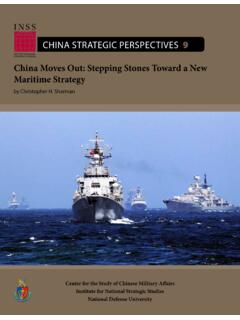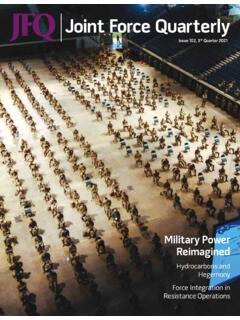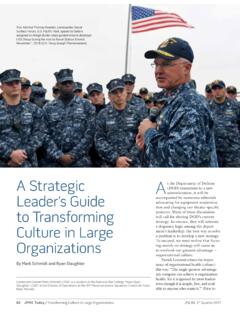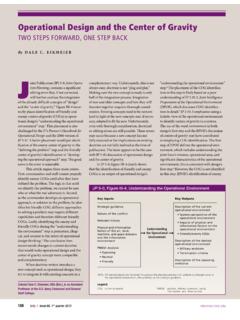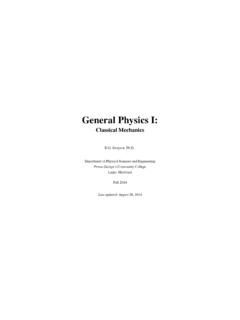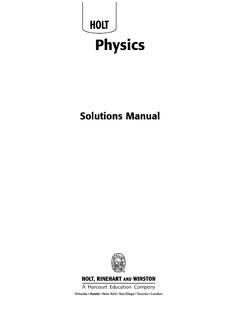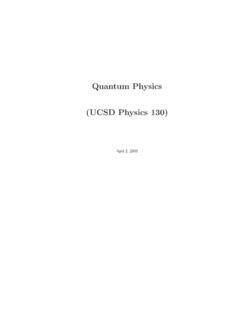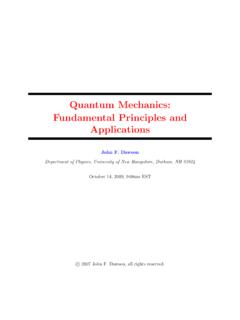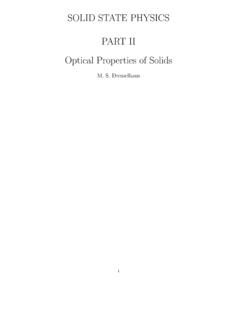Transcription of Defining and Regulating the Weaponization of Space
1 110 Features / The Weaponization of Space JFQ 74, 3rd Quarter 2014 Defining and Regulating the Weaponization of SpaceBy David C. DeFriezeThe creative conquest of Space will serve as a wonderful substitute for war. James smiTh mcdonnellFounder, McDonnell Aircraft CorporationSpace is a contested, congested, and competitive domain. Each year the international commu-nity relies ever more on Space -based technology for defense, civil, and commercial purposes. Accordingly, the Weaponization of Space has increasingly become an issue of concern. Space is an international common and is thus easier to protect through international cooperation. Since the beginnings of humanity s venture into Space , the international community has made attempts to define and regulate the placement and use of weapons there, but with only limited article discusses the international interest in controlling the Weaponization of Space and prior attempts to define and David C.
2 DeFrieze is an Attorney for the Army Contracting Command, Aberdeen Proving Ground, Space Station viewed over Earth s horizon (NASA)JFQ 74, 3rd Quarter 2014 DeFrieze 111regulate It then offers an approach to better achieve the international coopera-tion needed to meet global concerns over Space Reliance on SpaceThe international community has a great interest in maintaining Space as a peaceful arena and a secure place to conduct international activity. This has been recognized in treaties and policy statements involving almost all countries with an interest in Space . The Treaty on Principles Governing the Activities of States in the Exploration and Use of Outer Space , including the Moon and Other Celestial Bodies (the Outer Space Treaty) sets forth as its opening statement, The exploration and use of outer Space , including the Moon and other celestial bodies, shall be carried out for the benefit and in the interests of all countries, irrespective of their degree of economic or scientific devel-opment, and shall be the province of all mankind.
3 2 Such interest in peaceful uses of Space is understandable; it is a fragile environment. physics dictates that satellite orbits and Space launches are easy to observe and understand. Like sand castles, spacecraft are difficult to build but easy to destroy. Yet much of the world increasingly relies on Space for such peaceful purposes as communi-cations (cell phones, satellite television and radio, banking transactions), trans-portation (GPS and air traffic control), environmental management, observa-tions relating to resources, weather analysis and predictions, climate change, surveillance of natural disasters, and minimally invasive verification of inter-national treaties. Furthermore, com-mercial industry currently has a greater presence in Space than state actors, and global economic development is tied to the peaceful Space capabilities peaceful side of military power is also reliant on Space .
4 Self-defense against military buildup, invasion, or missile attack is enhanced by surveillance from Space . Such visibility of aggressive military actions can serve as a deterrent against aggression by providing targeted nations time to react and verify their concerns in international discussions. Finally, orderly regulation of Space Weaponization can help avoid a costly and potentially dev-astating arms race. Space , after all, is a congested and contested domain. If we do not establish order there, the struggle for availability of limited assets may ren-der it a cause for Earth-bound conflicts. For these and other reasons, the interna-tional community has been attempting to regulate the use of Space , and specifically to define and regulate the Weaponization of and ProposalsThe Outer Space Treaty.
5 In 1966, efforts began in the United Nations (UN) to establish an agreement to regulate activity in Space resulting in the Outer Space Treaty being signed in 1967. Relevant provisions included the overarching interest stated in Article I that the use of outer Space shall be for the benefit and use of all countries; Article III that activities shall be carried out in accordance with international law; Article IV that no nuclear weapons or weapons of mass destruction shall be placed in orbit around the Earth or placed on any celestial body; and Articles VI and VII that responsibility and liability shall be placed for damage caused by an object launched or by its components on This treaty laid the foundation for international coop-eration and further treaties between However, the ban on weapons in Space was limited to nuclear and other weapons of mass destruction as these types of weapons were of most concern during the Cold War era when the treaty was This treaty only addressed weapons that were placed in orbit or on a celestial body, and liability was not clearly spelled out.
6 A relevant treaty addressing liabilities for damages caused in Space is the Con-vention on International Liability for Damage Caused by Space and Russian Proposal. In February 2008, China and Russia jointly submitted to the UN Conference on Disarmament a draft Treaty on Prevention of the Placement of Weapons in Outer Space and of the Threat or Use of Force against Outer Space Objects (PPWT). This proposal attempted to define and prohibit the proliferation of weapons in Space and provided defini-tions of prohibited weapons. The PPWT defines a weapon in outer Space as any device placed in outer Space , based on any physical principle, which has been spe-cially produced or converted to destroy, damage or disrupt the normal function-ing of objects in outer Space , on the Earth or in the Earth s atmosphere, or to eliminate a population or components of the biosphere which are important to human existence or inflict damage on them.
7 7 The United States rejected the PPWT in 2008, but both China and Russia continue to propose this Resolution. The Prevention of an Arms Race in Outer Space (PAROS) is a UN resolution seeking a ban on the Weaponization of Space . It was origi-nally proposed in the 1980s from an ad hoc committee of the Conference on Disarmament. The proposal was rein-troduced in recent years and is voted on annually, with the United States being the only country to oppose Union Policy Proposal. In 2008 the European Union proposed a Space Code of Conduct, a voluntary set of rules regarding matters such as Space debris and operation of crafts or satellites in Space . It was rejected by most significant Space nations including the United States, China, Russia, and international community has rejected all three of these proposals in one form or another.
8 Specific reasons are dif-ficult to assess since security and political issues cloud the true intent. However, it is conjectured that concerns lie in the un-known aspects of Space and the desire of countries not to unduly limit themselves on future access, especially considering emerging technologies and defensive needs. Specific definitions of what physical properties or specific functions an object in outer Space contains would be too specific considering all the potential tech-nological developments that might the international community were to rely solely on the definition of 112 Features / The Weaponization of Space JFQ 74, 3rd Quarter 2014 weapon as set forth in the Chinese and Russian proposal, other means of destruction could still be used. We cannot outlaw hammers because they could be used as a blunt instrument to kill, nor can we prevent killing by out-lawing only items exclusively designed to kill because those bent on killing will still have hammers.
9 We must therefore outlaw the killing and attempts to kill. Similarly, we cannot punish only the possession of articles designed to kill others as people with hammers could still commit the offense. It is widely rec-ognized that any definition of what con-stitutes a weapon in outer Space must be driven in terms of what the object is used to do (that is, its instrumentality) rather than its physical properties. This makes common sense as one could not define a weapon on Earth by physical properties or what specific functions it is capable of. When discussing weapons and aggression, we need to look at the interests to be protected and find a means of enforcing those interests rather than the means chosen to assault those to John Pike, The profes-sion of arms remains the old art of killing people and breaking their things.
10 11 A man with a hammer can smash the neigh-bor s property or injure the neighbor s family. In our society, there are civil pen-alties to compensate the injured person and criminal sanctions to protect society as a whole, including taking away the criminal s freedom. With the commons of Space , there is currently no international police force armed with a means to enforce. Similarly, like the argument over gun control, if we outlaw all guns, only criminals will have guns and the rest will be helpless against them. It is therefore impossible to protect vital concerns over defense and security by Defining and Regulating against a weapon in Space . Instead we need to define and protect the interests to be achieved and the behavior that is considered interests and behaviors are defined, there must be a mechanism to identify who is responsible when poor behavior is observed, and a tribunal or adjudicator to provide professionalism, credibility, and equity to disputes relating to responsibility.


